The fall of Kabul in August 2021 marked a pivotal moment in Afghanistan’s history, signifying the withdrawal of foreign troops and the Taliban’s return as the de facto rulers of the country. Their resurgence prompted global apprehensions about their capacity to govern effectively and sustainably. Adopting a qualitative research approach, this paper draws on secondary sources to analyse the Taliban’s performance across key domains: economy, politics, civil liberties, security, and diplomacy, over the past three years. The analysis highlights that while the Taliban have managed to sustain their government despite a lack of international recognition and have taken steps to revive Afghanistan’s struggling economy, their governance has been marred by significant shortcomings in upholding civil liberties. The paper argues that the future sustainability of the Taliban regime hinges on four critical factors: ensuring internal security, addressing humanitarian needs of the population, consolidating control over the country, and engaging diplomatically to achieve international recognition.

Share this article

The Extraction Trap
Trump’s declaration to “run Venezuela” after Maduro’s capture is a seeming promise of a sudden cure to Venezuela’s ills. However, it ignores the nation’s terminal diagnosis of a century of plunder. The rhetoric of imminent revival on the basis of the speedy return of international oil capital and the promise of 100 billion US dollars in reconstruction funds made the intervention seem like a unique opportunity.

Future Shield: The Saudi-Pakistan Security Partnership
Although the SDMA does not identify an adversary, effectively functioning as a deterrent, it cannot be viewed in isolation from the Israeli belligerence in the Middle East. Israel’s war against Hamas has expanded beyond the genocide of Gaza; it has bombed the West Bank, Lebanon, Syria, Yemen, Iran, and recently Qatar. Tel Aviv’s campaign under the banners of ‘anti-Semitism’ and ‘terrorism’ has engulfed the whole Middle East in a war-like situation, which has generated new enemies and has deepened the instability of the region.

The Trilateral Shift
On 15 January 2026, the Pakistani defence production minister confirmed that an agreement for a new trilateral defence deal between Pakistan, Saudi Arabia, and Türkiye is in the pipeline, other than the Pakistan-Saudi bilateral deal announced last year.

